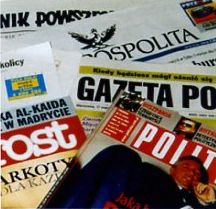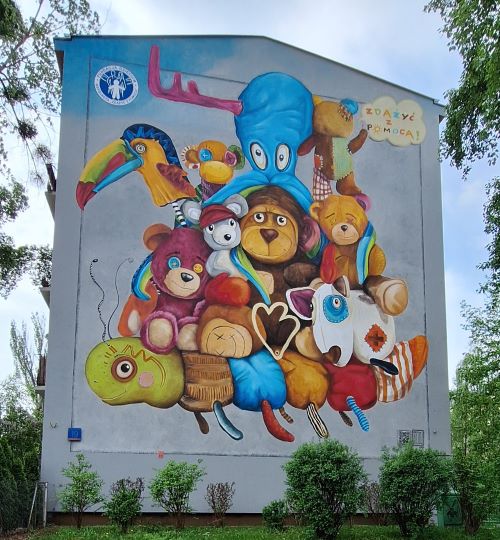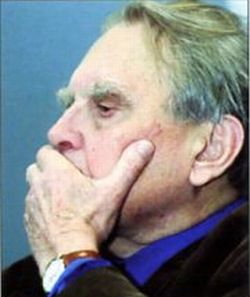20 kwiecień 2008
Press review
„A politician like myself has to take care of two sectors:
incarceration and hospitalization. Sooner or later I will land in one of these places” – ANDRZEJ LEPPER, leader of Samoobrona (for the Polish Press Agency).
Gazeta Wyborcza
„Poland is an Eastern border and potential transit route on a north-south axis. For years there has been a lack of a conscious strategy for maximalization of the benefits from this location. The instrument of such an understood position by Poland should be transport infrastructure but this is not the case. We entered the European Union with a serious defect, which harms the attractiveness of the country as a location for investment, transit opportunities and mass tourism.
In Poland transportation infrastructure was a bullet in the leg of the “economic tiger” of the 1990s. While in the EU water routes lighten the load of land routes (7-10 percent of cargo loads), in Poland land navigation remains a dead link in the transportation system. Dense railway connections, for a change, are aging before our eyes.
However the worst outcome is neglect of roads and highways. These losses are impossible to make up for because time doesn’t stand in one place. Communication routes of united Europe avoid Polish roads if they can. It is difficult to estimate lost transit, investment and tourist benefits. Poland remains the transportation heritage park of the EU.”
Janusz Lewandowki, May 17
Rzeczpospolita
„Poland, aside from Luxemburg, may soon be the only EU country, which does not have grocery products with a protected regional mark. We are trying to register mountain oscypek in Brussels, however the conditions according to which it is produced are in conflict with EU sanitary norms.
Poland, a country with rich culinary traditions, could boast many regional products.
I am referring here to kiełbasa sausage, hams, pickles, apples, mead and yellow cheese. However, all too often Polish producers compete between each other and do not want to work out a common recipe. They are afraid that in connection with registration they will be submitted to rigid production controls. Additionally, they are unable to prove that their products are unique. Frequently, as in the case of bryndza cheese, it is necessary to refer to documents from the Middle Ages.
Soon, however, it may turn out that Czechs, Slovaks and other countries of Central Europe will register products that would seem typically Polish. In the meantime our entrepreneurs will have to change their names.”
Jędrzej Bielecki, May 20
* * * * *
„During the recent academic conference “An Idea of Europe,” which took place at the Royal Castle in Warsaw, outstanding Polish philosopher Prof. Leszek Kołakowski, devoted the majority of his lecture to the Eu
ropean Constitution. The professor came out decidedly against the document, which – as he observed – is 20 times larger than the American Constitution and instead of legal regulations, contains merely wishes. The most dangerous aspect of the Convention’s project is centralized bureaucracy, which is heading towards a reduction of sovereignty for EU member countries. Professor Kołakowski warns: we do not know what may happen in Europe after the adoption of this Constitution. Will Chirac want to force smaller countries to forgo the help of the U.S.?
Some media report quite one-sidedly concerning the project surrounding the European Constitution. They ask us to believe that if it were not for Poland’s opposition, the constitution would have been adopted unanimously and enthusiastically in December of last year. Primarily leftist newspapers, which willingly blame us for blocking the constitution, are quoted in foreign press reviews. In reality we are not the main player in the fight concerning European legislative law. It is Great Britain that will decide whether the constitution enters into force or whether it will be blocked or fundamentally changed, which is not likely.
In Great Britain intense discussion has erupted, in which opponents of the constitution outnumber its proponents. Not only conservatives are against it but also a significant number of labor representatives. When British affections for freedom and tradition are at stake, the nation unites.”
Krystyna Grzybowska, May 24
Polityka
„Throughout Poland from October of last year until April 2004 the Agricultural Restructuralization and Modernization Agency (ARiMR) organized 40,327 training sessions, in which nearly 1.1 million farmers and 35 thousand employees from county offices, rural teachers and representatives of agricultural organizations, who today should help in filling out applications for subsidies, took part.
During these sessions 762 thousand farmers filled out a special survey which indicates that 67 percent of the union’s subsidy system is understandable. Each participant could also receive a free extract from the land registry including his farm.
In April the Minister of Agriculture Wojciech Olejniczak, full of enthusiasm, assured that 1.8 million Polish farmers would apply for territorial subsidies. In the space of one month barely 105 thousand farmers applied. He is counting on the 1.4 million which have yet to apply.
If farmers declare fewer hectares for subsidies than the 14.6 million announced by the government then this will certainly quiet union budget guards in Brussels. The Polish government will have to swallow a bitter pill, however, if it turns out that what was negotiated with great difficulty, Polish agriculture is not able to take advantage of.
The whole campaign would be more effectively carried out if not for the mess in land records and if Polish farmers regulated their properties. Many plots are in the process of inheritance procedures, some are being leased, often for free. Farmers have now begun to straighten out these matters because union subsidies are not applicable to landowners but to its users. Ministerial bureaucracy also had an influence on delays in submitting applications.
Many farmers are afraid of inspections of their farms. In accordance with union requirements 5-7 percent of farmers will be visited by inspectors in July and August. They will measure plots and make sure that the crops grown on each plot are the same as those listed in applications for subsidies. There will be no consequences for mistakes of up to 3 percent of the plot area. For errors of over 20 percent the farmer will be prevented from receiving union subsidies for the next three years. This is also a serious psychological barrier.”
Marek Henzler, May 22
Wprost
„The German minority in Opolskie province which – according to the general census of 2002 – makes up 20 percent of the population, is attempting to impose its vision for the region. The minority administers independently in five of the 12 administrative units and in 25 of the 71 counties of the province. It co-administers in 2 administrative units and 13 counties. In the province assembly the German minority party and Social Democratic Alliance (SLD) form the ruling coalition. Two assembly deputy speakers come from the minority party. A representative of the minority is also deputy province governor.
German disregard for their fellow Polish citizens causes eruptions of conflict every few months. The subjects of these arguments are monuments, schools and bilingual inscriptions. The law allows for bilingual signs but forbids the translation of proper names of localizations. Notice boards must have another shape, color and font – but only on paper. Notice boards at the county office in Strzelce Opolskie announce that this is the county administration of Gross Strehlitz. This is the pre-war name of the city.
The mobilization of Germans in Opolskie province has a long-term goal: to rebuild a replica of the Heimat from 30 years ago, during the Third Reich. They try to do this in Poland because in Germany it would be illegal. In cooperation with German compatriots and the Refugee Union of Erika Steinbach, Germans of the region want to create Heimat for all of their compatriots. Heimat, which would be a cradle of Germanity.
Rudi Pawelka, leader of the Silesian Compatriots, demands the return of property abandoned by Germans in Poland. ‘You return property to Americans and Jews but not to Germans. According to the laws of the EU that is discrimination. We don’t intend to take anything away from anyone but we hope that Polish authorities will allow refugees who wish to return to their Heimat without interference,’ says Pawelka.”
Tomasz Krzyżak, May 30
* * * * *
„A Polish pharmaceutical Bermuda triangle has been created, in which the money of patients is disappearing. Its boundaries – in the face of passivity on the part of state officials – are defined by large concerns, doctors and pharmacists. The effect? Poles pay one and a half times more for prescription drugs than Italians, Greeks, French or Belgians. The prices of the 25 most popular prescription medications in Poland are on average 4 percent higher than in the EU. If we take into account the purchasing power of our salaries, we have the most expensive, except for Latvia, pharmaceuticals among the 25 countries of the expanded EU.
At the beginning of the 1990s, the average Pole spent an even 25 euro on medicine, while one and a half years ago that figure was already 73 euro. Not only demand for medicines is growing but also their prices despite draconian state regulations (official prices, official margins, refund lists, etc.) similar to those used around the world. The Treasury claims that since 2000, pharmaceutical concerns have inflated the prices of imported drugs in violation of regulations.
This would mean that Poles are doubly cheated: once as patients buying expensive medicines in pharmacies and a second time as taxpayers of the state drug refund system (the higher the price, the higher the budget subsidy). The Ministry of Health indicates that because of expensive drugs, the costs of hospital services have also risen. The sum of possible sanctions in relation to about 80 firms amounts to – according to government estimates – between 1 and 2 billion euro. However, the blame for price hikes in Poland rests first and foremost with the government because large firms, including pharmaceutical firms, have a right to maximalize their profits.”
Jan Piński, Krzysztof Trębski, May 2
Tygodnik Powszechny
„The Catholic Church is not in favor of any economic system, nor is it called to outline short-term market plans. It always points to the good in man, respect for his work and minimum social benefits. I argued with Leszek Balcerowicz (author of Polish market reforms at the turn of 1989/1990, editor), who said: “First you have to bake the bread.” I answered: „Agreed, but make sure that people don’t starve while the bread is baking.” I think we are both right. The free market is most effective operating market mechanism but we must remember that the economy is meant to serve man and not man the economy.
That’s why voices of criticism, which accuse the Catholic Church of not supporting liberalization of the economy, privatization and introduction of free competition principles, are nonsensical. The pulpit is not the place for convincing workers about the usefulness of restructuralization of their plants. The Church is responsible for providing help and support to those who have been marginalized by market transformations: the poor, hungry, homeless, single mothers and unemployed.”
Biskup Tadeusz Pieronek, May 23
























FROM THE EDITOR
The first weeks
On May 23 in the small town of Września, pre-elections to the European Parliament were organized. This was a test: who will win and with what kind of turnout? The most important politicians flocked to Września. więcej...